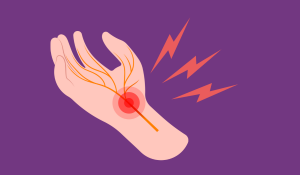Somatic pain comes from the body’s tissues, skin and muscles. When sensory nerves, or nociceptors, pick up changes and interpret them as tissue damage, the nerves send signals to the brain that register as pain. Somatic pain is sometimes chronic. CBD has shown the ability to help with somatic pain as well as the mental and physical effects of psychosomatic disorder.
Pain is universal to the human condition and comes in many forms. One common type is somatic pain.
While the term may be unfamiliar, most people have experienced somatic pain. It is felt in the skin, muscles or tissue. Somatic pain differs from visceral pain, which takes place in the internal organs.
When sensory nerves, or nociceptors, pick up temperature changes, vibrations or swelling in the muscles, joints or skin, they associate these variations with tissue damage. Nociceptors send pain signals to the brain. Somatic pain can be one of two types:
Pain treatment depends on its cause and severity. Mild, acute pain from a minor injury such as a knee scrape or muscle cramp can be treated with over-the-counter painkillers, including ibuprofen. Deeper or long-lasting pain, such as a broken bone or back injury, can be treated with muscle relaxants. Opioids are sometimes prescribed for chronic, severe pain. Opioids carry a risk of substance abuse.
Patients with persistent pain may wonder if or how CBD oil can help. Research has shown that CBD is very promising as a treatment for chronic pain. CBD does not cause the psychological effects of marijuana because it does not contain THC. It is not addictive and can potentially replace opioids. In addition, CBD side effects are generally minimal if present at all. Because it can help with mental function, CBD can potentially treat the physical and mental symptoms of psychosomatic disorder.
While research is ongoing, many people report treating pain successfully with CBD.

Explore this cbd consumption methods tutorial and follow the step-by-step process to select, use, and verify the safest ways to consume CBD for wellness.
Read More
Learn what CBD edibles are, their main types, expected effects, legal status, safety factors, and how they compare to other forms of CBD.
Read More
Therapeutic Uses of CBD Managing Chronic Pain with CBD Struggling with chronic pain? CBD might help. Studies suggest it can reduce inflammation and alleviate discomfort,...
Read More
Just as CBD may help humans due to its interaction with the body’s endocannabinoid system, the same is true of dogs. CBD has the potential...
Read More
Cannabis has been used for millennia to treat numerous health conditions. Current research offers promising results on the effects of CBD oil on breast cancer.
Read More
What Is CBD for Cats? CBD (Cannabidiol) is a natural compound from hemp. It’s non-psychoactive, meaning your cat won’t get “high.” Instead, it works with...
Read More
1. Understanding Neuropathic Pain Neuropathic pain results from nerve damage or dysfunction, causing symptoms like burning, tingling, or sharp shooting pains. Common Causes: Symptoms Include:...
Read More
CBD for Pets: A Pet Parent’s Guide to Dosage We all want the best for our pets, especially when they’re struggling with pain, anxiety, or...
Read More
What Is Lupus? Lupus is a long-term autoimmune condition that can impact multiple organs, including the skin, heart, lungs, and kidneys. The most common type...
Read More
1. Full-Spectrum CBD: The All-In-One Option What it is: Contains CBD, minor cannabinoids, terpenes, flavonoids — and less than 0.3% THC. Why choose it: Promotes...
Read More